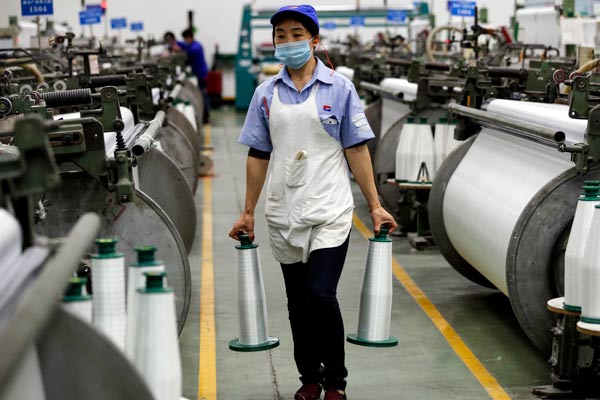
Forbes comments: "Recent figures suggest China's labor costs are rising fast, which could be good news, and could be bad. Certainly the amount of Chinese people able to rise out of poverty is one of the signature achievements of the early 21st century, but the prospect of wage inflation could signal bad news for an economy whose key comparative advantage has until now been low labor costs. The speed of the increase, however, invites consideration of whether China has reached the 'Lewis Turning Point'?... It comes about as the migration of agricultural labor to the industrializing cities–released by agricultural mechanization–starts to slow up, and results in a rapid rise in wage costs as the available labor pool becomes suddenly shallower...Rising wages may spur a long awaited boom in domestic consumer spending and speed China along the manufacturing value curve as higher labor costs drive investment in more capital intensive production technology. In turn this might raise the prospect of resource efficiency gains, rather than the simple resource deployment gains that have hitherto driven China's growth, creating a virtuous cycle of growing demand and better calibrated investment and helping China vault over the middle-income trap."
- The New York Times reports: "Mao once branded capitalists enemies of the Chinese people. In the era of President Xi Jinping, those capitalists are billionaire lawmakers — and they're getting even wealthier. The combined fortune of the wealthiest members of China's Parliament and its advisory body amounts to $500 billion, just below the annual economic output of Sweden. Among that group of 209 entrepreneurs and business tycoons, the 100 richest saw their net worth rise 64 percent in the four years since Mr. Xi took power, according to the Hurun Report, an organization based in Shanghai that tracked the wealth of the delegates, ahead of their annual joint sessions that start on Friday in Beijing...The increasing wealth of lawmakers 'tells us that political power and money have remained tightly intertwined in China: this is a structural issue that Xi cannot solve,' but only hide, said Jean-Pierre Cabestan, a professor of Chinese politics at Hong Kong Baptist University...'That's part of the stability of the Communist Party," he added. "So there may not be that earthquake so fast.' "
- Bloomberg reports: "China has the economic power to move markets, and it isn't afraid to use it. South Korean stock trading offered a case in point Friday, with a selloff in hotels, cosmetic makers and other tourism-related companies that made the country's benchmark the worst performer among Asian equity markets. The slide followed a Yonhap news agency report on China ordering travel agents to halt sales of holiday packages to South Korea...The broader takeaway: while South Korea has given no indication it would change its plans, there can be risks of economic damage -- at least for a time -- that offer investors both dangers and opportunities. 'There is actually no industry in Korea that is free from THAAD risks,' said Jung Sang Jin, who helps manage the equivalent of $33 billion at Korea Investment Management Co. in Seoul, using the abbreviation for the U.S. missile-defense system. 'Many companies have plants in China, and China could halt operation at those plants.' "
- 2017-03-02 How Trump could find common ground with China, thanks to the Islamic State
- 2017-03-01 Economic Coercion, with a Chinese Twist
- 2017-02-28 'The president always gets something': Spicer suggests Trump gained concession from China
- 2017-02-27 1st senior Chinese official visits Washington in Trump era
- 2017-02-26 For More Chinese Firms, It Pays to Make It in the USA
- 2017-02-24 China hits back at Donald Trump's 'champion of currency manipulation' jibe
- 2017-02-23 As China Ups Heat on NKorea, US Faces Questions
- 2017-02-22 Exclusive: China finishing South China Sea buildings that could house missiles - U.S. officials
- 2017-02-21 Chinese premier appeals to Washington to avoid ‘trade war’
- 2017-02-20 Chinese Bank Cleanup Plan Could Leave a Mess
- The New York Times Chinese Lawmakers' Wallets Have Grown Along With Xi's Power
- Bloomberg China Roils South Korean Stocks With News of Travel Curbs
- NPR China Describes Its Vision Of Government-Controlled Internet
- The New York Times China's Response to Reports of Torture: 'Fake News'
- The Wall Street Journal Foreign Investors Spurn China's Markets
- The Guardian BBC crew attacked in China and forced to sign confession
- The Wall Street Journal Chinese Retaliation Over Antimissile System Has South Korea Worried
- Reuters China to target young of Taiwan, Hong Kong to boost loyalty
- The Financial Times China power struggle creates commodity snakes and ladders
- Bloomberg The Big Problem With China's Bridge and Tunnel Addiction
- Reuters U.S. carrier puts on show of 'commitment', not power, in South China Sea
- USA Today Air pollution in Asia is wafting into the USA, increasing smog in West
- The Financial Times Chi-Med eyes global markets after cancer trial success
- Forbes China Is Running Out Of Cheap Rural Labor And It's Because Of Failed Reforms
- Fortune Here's How Tesla Broke $1 Billion Sales in China
- Quartz China is trying to punish South Korea by keeping its tourists away
- Foreign Policy China Quietly Abandoning Bid for 'New Model of Great Power Relations' With U.S.
- The Hill Affirming the 'One China' policy by forging stronger ties with Taiwan
- Barron's Hang Seng Rally Stalled: Will Mainland China Money Return?
- The Washington Post: Opinions Do African exports to China hurt labor rights? Here's what we found.
